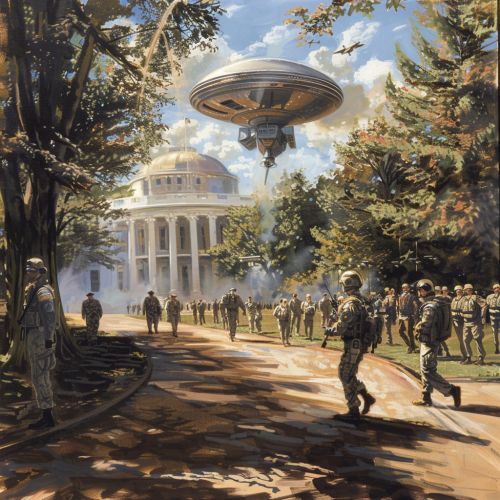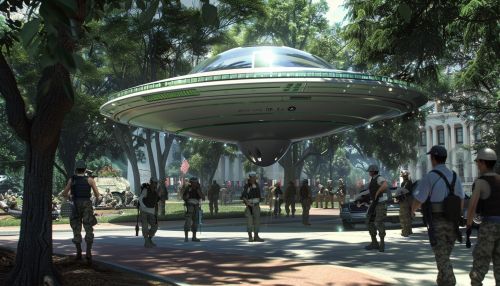The Day the Earth Stood Still
Overview
The Day the Earth Stood Still is a seminal work in the science fiction genre, originally released as a film in 1951, directed by Robert Wise and based on Harry Bates' 1940 short story "Farewell to the Master." The narrative explores themes of Cold War tensions, the potential for nuclear warfare, and the broader implications of human behavior on a cosmic scale. This article delves into the film's plot, themes, production, and its impact on popular culture and science fiction.
Plot Summary
The film begins with the arrival of an extraterrestrial spacecraft in Washington, D.C. The alien visitor, Klaatu, and his robot companion, Gort, emerge from the craft, causing widespread panic. Klaatu announces that he has come in peace but is shot by a nervous soldier. He is taken to a hospital where he reveals his mission: to deliver an urgent message to the leaders of Earth.
Klaatu escapes from the hospital and assumes the alias "Mr. Carpenter." He lodges at a boarding house where he befriends Helen Benson and her son, Bobby. Klaatu's interactions with humans reveal his growing concern about their aggressive tendencies. He eventually meets with Professor Barnhardt, a leading scientist, to discuss his message: Earth must abandon its violent ways or face destruction from a coalition of planets that have outlawed war.
In a dramatic climax, Klaatu is fatally shot by the military but is resurrected by Gort. He delivers his final warning to the assembled scientists and departs, leaving humanity to ponder its future.
Themes
Cold War Context
The Day the Earth Stood Still was released during the height of the Cold War, a period characterized by geopolitical tension between the United States and the Soviet Union. The film reflects contemporary anxieties about nuclear weapons and the potential for global annihilation. Klaatu's warning serves as an allegory for the need for international cooperation and disarmament.
Human Nature
The film explores the duality of human nature, juxtaposing our capacity for violence with our potential for peace and rationality. Klaatu's interactions with ordinary people, particularly Helen and Bobby, highlight the possibility of redemption and change. The character of Professor Barnhardt symbolizes the role of science and intellect in guiding humanity towards a better future.
Extraterrestrial Intervention
The concept of extraterrestrial beings intervening in human affairs is a recurring theme in science fiction. In this film, the advanced alien civilization represents a higher moral authority, enforcing peace through the threat of annihilation. This raises ethical questions about the use of force to achieve peace and the sovereignty of nations.


Production
Development
The film was produced by 20th Century Fox and directed by Robert Wise, who would later helm other notable science fiction films such as The Andromeda Strain and Star Trek: The Motion Picture. The screenplay, written by Edmund H. North, was adapted from Harry Bates' short story but introduced significant changes, including the character of Gort and the film's iconic ending.
Special Effects
The special effects in The Day the Earth Stood Still were groundbreaking for their time. The design of the spacecraft and Gort, the robot, were particularly innovative. The film employed a combination of practical effects and early optical effects to create the illusion of advanced alien technology.
Music
The film's score, composed by Bernard Herrmann, is notable for its use of the theremin, an electronic instrument that produces an eerie, otherworldly sound. Herrmann's music significantly contributes to the film's atmosphere and has been widely praised.
Impact and Legacy
Cultural Influence
The Day the Earth Stood Still has had a lasting impact on popular culture and has been referenced in numerous other works of science fiction. The phrase "Klaatu barada nikto," used by Helen to command Gort, has entered the lexicon of science fiction fans and has been referenced in various media.
Critical Reception
Upon its release, the film received positive reviews for its thought-provoking themes and innovative special effects. It has since been recognized as a classic of the genre and has been preserved in the United States National Film Registry for its cultural, historical, and aesthetic significance.
Remake
In 2008, a remake of The Day the Earth Stood Still was released, starring Keanu Reeves as Klaatu. While the remake updated the story to reflect contemporary issues such as environmental degradation, it did not achieve the same critical acclaim as the original.
See Also
- Cold War
- Nuclear weapons
- 20th Century Fox
- The Andromeda Strain
- Star Trek: The Motion Picture
- Theremin
- United States National Film Registry
- Remake
